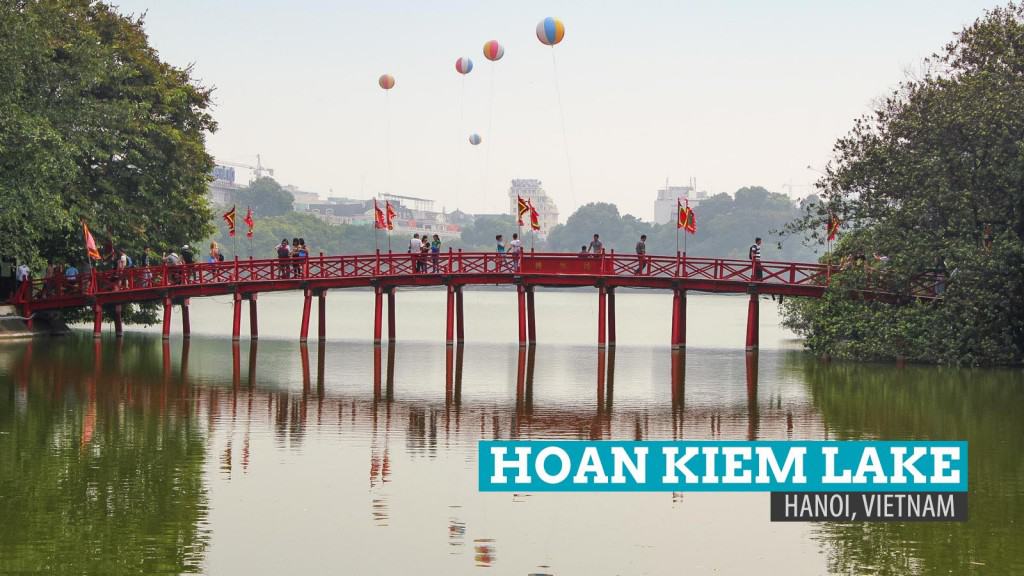On the Chu River in Thanh Hóa Province lived a fisherman named Lê Thận. One night, Thận hauled up his fishing net. It felt heavy and Thận was filled with joy thinking he was going to have a big catch. Pulling the net to the boat side, though, Thận saw the “catch” to be nothing but an iron bar resembling a blunt knife without a handle. “Ah me,” Thận sighed, “the only catch for the whole night and it turns out to be this worthless piece of iron.” Thận threw it away.
It is the start of the Legend of the Restored Sword Lake as told by the official website of Vietnam. It is a long story but the short of it is that the iron bar appeared to Thận in the following nights too and on the third evening, he picked it up and realized it was the blade of a sword.
It was the early 1400s and the Ming Chinese had taken over this part of Vietnam. To help with the rebellion, Thận joined the insurgent army led by Lê Lợi, who then found a shining sword hilt that matched the blade perfectly. With this sword, Lê Lợi emerged victorious and eventually became king. One day, while boating at the lake in the center of his capital, a giant tortoise swam towards him and bowed.
“Now that peace has been restored to the nation,” it said, “please return the sword to our God of Waters. Lê Lợi surrendered the sword but its radiance remained on the surface of the water. Since then, it was called Restored Sword Lake or, in Vietnamese, Hồ Hoàn Kiếm.
At the center of the historical district of Hanoi, Hoàn Kiếm Lake is impossible to miss and its calls impossible to refuse. Circling the lake is always a rewarding experience. It is surrounded by temples and historic monuments that is worth a look or two.
Ngoc Son Temple: Temple of the Jade Mountain
Nestled on Jade Island, small islet near the lake’s northern edge, the Temple of the Jade Mountain is perhaps the most visited tourist site around the lake. Built in the 18th century, it is a tribute to Tran Hung Dao, a military leader who fought the Yuan conquerors. In 1864, Confucian master Nguyen Van Sieu made renovations and constructed gates at the entrance complex.
The first gate features parallel sentences. Here the Pen Tower rises. Also called Thap But in vernacular, the Pen Tower is ten meters tall and is made of stone. It gets its name from the shape of its tip which looks like a writing brush mounted on a peach. The writing on the tower says “writing on the clear blue sky,” which means to be honest. The second gate boasts Taoist symbols including the tiger, the carp, the phoenix, and the Vietnamese dragon. On the third gate is an ink slab, which Nguyen Van Sieu installed on the very spot where the shadow of the Pen Tower falls. He added it on May 5 of the lunar calendar in honor of scholar and saint of literature Van Xuong, whose star passes the sun on this date.
There are two pavilions: Đắc nguyệt lâu (Moon Contemplation Pavilion) and Đình Trấn Ba (Pavilion Against the Waves). Inside is the preserved body of a giant turtle, whose scientific name Rafetus Leloii it got from Lo Lei in the legend. This soft-backed turtle measures 2.1 meters long and weighs 250 kg. It was found at this very lake in 1968. A critically endangered species, a few of these turtles are still believed to inhabit the lake although sightings have been rare.
The Huc: Bridge of the Welcoming Sunshine
Ngoc Son Temple is connected to the lakeshore by a scarlet bridge called the Huc, which means “rising sun.” (Other sources say it means “morning sunlight” or “welcoming sunshine.”) Lined with colorful flags, the Huc Bridge is a standout structure amidst the green and grey environment. The design is classical Vietnamese.
The Turtle Tower
Near the other end of the lake is the grass-carpeted Turtle Island (Dao Rua), which harbors a small structure called Turtle Tower (Tháp Rùa). The three-tiered tower was built in 1886 to remind the public of the legend of the restored sword. It is perhaps the most photographed element in the lake. Food stalls and small cafes stand by the southern lakeshore, offering a magnificent view of the tower.
It is also a favorite pictorial spot for young Vietnamese couples. Every morning, there are couples and photographers having what looks like a pre-nuptial shoot. I’m not sure; I just assumed.
Le Thai To Memorial and Temple
Just across the street from the western shore of Hoan Kiem is a memorial and temple dedicated to Le Loi, the central character in the legend. His temple name is Le Thai To. Constructed in 1896, the memorial features a statue on a very high pedestal, erected in the middle of a shrine and garden. It’s a small pocket of green in the rapidly developing Hanoi but is a nice place to visit if you’re around the area.
According to the legend, when the giant turtle took the divine sword from Le Loi, its luster spread over the water. Of course, Hoàn Kiếm Lake does not have the legendary “glow” today but it remains a crowd drawer nonetheless. Even I was not able to dodge its hypnotic charm. Blame it to its sheer beauty or its proximity to the Old Quarters where my hotel is located. In the six days that I stayed in the Vietnamese capital, I found myself spending ALL of my mornings here — walking around it, having a cup of bubble tea, watching the people, sometimes talking to other travelers, and — although chances are very slim — hoping to see one of those giant turtles that are believed to still be in the lake.
Posted: 2013 • 6 • 19
